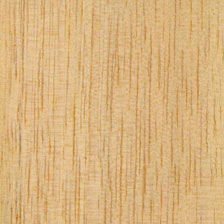Ilomba

Other names
Eteng, Pycnanthus
Scientific Name
Pycnanthusangolensis
Family
Myristicaceae
Description
The heartwood is whitish to pinkish brown, sometimes with yellowish markings and indistinctly demarcted from the sapwood. The grain is generally straight, the texture medium to coarse. The wood has no lustre and when freshly sawn it has an unpleasant odour which disappears on drying.
Density
(H=12%) :0,48
Treatability
Permeable
Seasoning
Ilomba is rather difficult to dry, it is prone to collapse, end splitting and distortion. Good ventilation is required for air drying. Kiln drying can give good results if done carefully.
Stability
moderately stable
Durability
not durable and liable to attack by termites, powder-post beetles, pinhole borers and marine borers, but it is permeable to preservative
Workability
Ilomba is easy to saw and plane with normal tools; blunting effects are moderate. It is difficult to polish. Nailing and screwing are easy and holding properties are good. The wood may stain in contact with tools. It peels and slices well to produce good-quality veneer and plywood, although steaming is recommended because of the occasional presence of numerous small hard spots. It glues well with all types of glue. It paints well but is rather absorbent.
End-Uses
- Veneer for interior of plywood
- Veneer for back or face of plywood
- Blockboard
- Moulding
- Interior panelling
- Exterior panelling
- Boxes and crates
- Interior joinery
- Current furniture or furniture components
- Rolling shutters Pencils